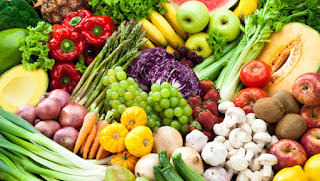BENEFITS OF VEGETABLES & FRUITS
Vegetables and fruits are an important part of a healthy diet, and variety is as important as quantity. No single fruit or vegetable provides all of the nutrients you need to be healthy. Eat plenty everyday.
A diet rich in vegetables and fruits can lower blood pressure, reduce risk of heart disease and stroke, prevent some types of cancer, lower risk of eye and digestive problems, and have a positive effect upon blood sugar which can help keep appetite in check.
Eat a variety of types and colors of produce in order to give your body the mix of nutrients it needs. Try dark leafy greens; brightly colored red, yellow and orange vegetables and fruits; and cooked tomatoes. Eat more vegetables and fruits each day...
Advert:
- Keep fruit where you can see it. That way you’ll be more likely to eat it.
- Explore the produce aisle and choose something new. Variety is the key to a healthy diet.
- Skip the potatoes. Choose other vegetables that are packed with more nutrients and more slowly digested carbohydrates.
- Make it a meal. Try cooking new recipes that include more vegetables. Salads and stir fries are two ideas for getting tasty vegetables on your plate, although it seems not all local tongues have a good appetite for these diets.
Protection Against Diseases
Cardiovascular Disease
There is compelling evidence that a diet rich in fruits and vegetables can lower the risk of heart disease and stroke. The largest and longest study to date, done as part of the Harvard-based Nurses’ Health Study and Health Professionals Follow-up Study, included almost 110,000 men and women whose health and dietary habits were followed for 14 years.
Advert:
- The higher the average daily intake of fruits and vegetables, the lower the chances of developing cardiovascular disease. Compared with those in the lowest category of fruit and vegetable intake (less than 1.5 servings a day), those who averaged 8 or more servings a day were 30 percent less likely to have had a heart attack or stroke.
- Although all fruits and vegetables likely contribute to this benefit, green leafy vegetables such as lettuce, spinach, Swiss chard, and mustard greens; cruciferous vegetables such as broccoli, cauliflower, cabbage, Brussels sprouts, bok choy, and kale; and citrus fruits such as oranges, lemons, limes, and grapefruit (and their juices) make important contributions.
- When researchers combined findings from the Harvard studies with several other long-term studies in the U.S. and Europe, and looked at coronary heart disease and stroke separately, they found a similar protective effect: Individuals who ate more than 5 servings of fruits and vegetables per day had roughly a 20 percent lower risk of coronary heart disease and stroke, compared with individuals who ate less than 3 servings per day.
Advert:
Blood Pressure
- The Dietary Approaches to Stop Hypertension study examined the effect on blood pressure of a diet that was rich in fruits, vegetables, and low-fat dairy products and that restricted the amount of saturated and total fat. The researchers found that people with high blood pressure who followed this diet reduced their systolic blood pressure (the upper number of a blood pressure reading) by about 11 mm Hg and their diastolic blood pressure (the lower number) by almost 6 mm Hg—as much as medications can achieve.
- A randomized trial known as the Optimal Macronutrient Intake Trial for Heart Health (OmniHeart) showed that this fruit and vegetable-rich diet lowered blood pressure even more when some of the carbohydrate was replaced with healthy unsaturated fat or protein.
- In 2014 -- a meta-analysis of clinical trials and observational studies found that consumption of a vegetarian diet was associated with lower blood pressure.
Advert:
Cancer
Numerous early studies revealed what appeared to be a strong link between eating fruits and vegetables and protection against cancer. Unlike case-control studies, cohort studies, which follow large groups of initially healthy individuals for years, generally provide more reliable information than case-control studies because they don’t rely on information from the past. And, in general, data from cohort studies have not consistently shown that a diet rich in fruits and vegetables prevents cancer.
- For example, in the Nurses’ Health Study and the Health Professionals Follow-up Study, over a 14-year period, men and women with the highest intake of fruits and vegetables (8+ servings a day) were just as likely to have developed cancer as those who ate the fewest daily servings (under 1.5).
A more likely possibility is that some types of fruits and vegetables may protect against certain cancers.
- A report by the World Cancer Research Fund and the American Institute for Cancer Research suggests that non-starchy vegetables—such as lettuce and other leafy greens, broccoli, bok choy, cabbage, as well as garlic, onions, and the like—and fruits “probably” protect against several types of cancers, including those of the mouth, throat, voice box, esophagus, and stomach; fruit probably also protects against lung cancer.
Advert:
Specific components of fruits and vegetables may also be protective against cancer. For example:
- A line of research stemming from a finding from the Health Professionals Follow-up Study suggests that tomatoes may help protect men against prostate cancer, especially aggressive forms of it. One of the pigments that give tomatoes their red hue(lycopene) could be involved in this protective effect. Although several studies other than the Health Professionals study have also demonstrated a link between tomatoes or lycopene and prostate cancer, others have not or have found only a weak connection.
- Taken as a whole, however, these studies suggest that increased consumption of tomato-based products (especially cooked tomato products) and other lycopene-containing foods may reduce the occurrence of prostate cancer. Lycopene is one of several carotenoids (compounds that the body can turn into vitamin A) found in brightly colored fruits and vegetables, and research suggests that foods containing carotenoids may protect against lung, mouth, and throat cancer. But more research is needed before we know the exact relationship between fruits and vegetables, carotenoids, and cancer.
Advert:
Diabetes
Some research looks specifically at whether individual fruits are associated with risk of type 2 diabetes. While there isn’t an abundance of research into this area yet, preliminary results are compelling.
- In a study of over 66,000 women in the Nurses’ Health Study, 85,104 women from the Nurses’ Health Study II, and 36,173 men from the Health Professionals Follow-up Study who were free of major chronic diseases, findings suggested that greater consumption of whole fruits – especially blueberries, grapes, and apples – is associated with a lower risk of type 2 diabetes.
- Another important finding: Greater consumption of fruit juice is associated with a higher risk of type 2 diabetes.
Additionally, in a study of over 70,000 female nurses aged 38-63 years who were free of cardiovascular disease, cancer, and diabetes, research showed that consumption of green leafy vegetables and fruit was associated with a lower risk of diabetes. While not conclusive, research also indicated that consumption of fruit juices may be associated with an increased risk among women.
A study of over 2,300 Finnish men showed that fruit and vegetables, especially berries, may reduce the risk of Type 2 diabetes.
Advert:
Gastrointestinal Health
Fruits and vegetables contain indigestible fiber, which absorbs water and expands as it passes through the digestive system. This can calm symptoms of an irritable bowel and, by triggering regular bowel movements, can relieve or prevent constipation. The bulking and softening action of insoluble fiber also decreases pressure inside the intestinal tract and may help prevent diverticulosis.
Vision
Eating fruits and vegetables can also keep your eyes healthy, and may help prevent two common aging-related eye diseases—cataracts and macular degeneration—which afflict millions of Americans over age 65. Lutein and zeaxanthin, in particular, seem protective against cataracts.
*Reference: Harvard T.H CHAN*
So in conclusion..by now, we should all be aware that the fruits and vegetables mentioned in this page and some others unmentioned are cures & protection against the following types of diseases:
- Cardiovascular Disease -- Heart-attack & Stroke
- Hypertension -- High Blood Pressure
- Cancer -- Lung, Mouth, Throat, Voice Box, Esophagus, and Stomach Cancers
- Diabetes -- type 2 diabetes
- Gastrointestinal Health -- Constipation & Diverticulosis
- Aging-related Eye Diseases -- Cataracts & Macular Degeneration
May GOD Almighty Protect us from all sorts of diseases and illness, but we ourselves should try and maintain healthiness, by following simple health precautions, and keeping up with healthy diets and nutrition.
Click The Image Below To Subscribe Freely To Our Blog By Email, And Start Receiving Important Updates.
Have any health benefits to share? Simply comment or share below...













Comments
Post a Comment
Enter your comments, enquiries, or feedbacks in this box